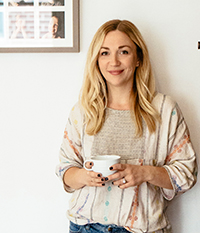On Sept. 28, journalist, former talk show host and author Katie Couric shared a very personal message with her readers in an essay titled ‘Why Not Me’ – she has breast cancer. “June 21, 2022, was the first day of summer, my 8th wedding anniversary, and the day I found out I had breast cancer,” she wrote on her website, Katie Couric Media.
Cancer is not new to Couric. Her first husband, Jay Monahan, died in 1998 of pancreatic cancer at the age of 41. Her mother kept mantle cell non-Hodgkin’s lymphoma at bay for 10 years. Her father had prostate cancer, which was treated with radioactive seeds, while her sister died from the same cancer at age 54. Given her family history, Couric wrote her reaction went from “Why me? to Why not me?”
While Couric had “practically become an expert” on colon and pancreatic cancers (the Jay Monahan Center for Gastrointestinal Health was opened in New York in 2004), breast cancer was new to her. While she was usually vigilant in scheduling her yearly mammograms, her gynecologist noted during an appointment that she was overdue.
Couric rushed to scheduled her exam. The visit with breast radiologist Dr. Susan Drossman included a state-of-the-art 3D mammogram machine, which gives clinicians a more complete view of the breast tissue. Since Couric has dense breast tissue, she routinely gets an additional screening using a breast ultrasound. Dr. Drossman found “something they needed to check out” and performed a biopsy. The next day, Couric received the call.
“Your biopsy came back. It’s cancer. You’re going to be fine but we need to make a plan.” Dr. Drossman told Couric.
Treatment
Couric quickly turned her disbelief into action. Her tumor was hormone receptor-positive, Her2neu-negative and highly treatable, particularly when detected early. After a visit with Dr. Lisa Newman at NewYork-Presbyterian/Weill Cornell Medical Center, she had a plan for a “breast conservation” surgery (lumpectomy) on July 14, followed by radiation and then “aromatase inhibitor” medication for five years.
“Throughout the process, I kept thinking about two things: How lucky I was to have access to such incredible care, since so many people don’t. And how lucky I was to be the beneficiary of such amazing technology. It made me feel grateful and guilty — and angry that there’s a de facto caste system when it comes to healthcare in America,” Couric wrote.
Pathology results had good news; her lymph nodes were clean. The likelihood of her stage 1A cancer returning was low, so she could forgo chemotherapy. However, the tumor was bigger than expected.
Radiology began in early September, and her last round was Sept. 28.
Couric’s Powerful Message
Couric is telling her personal cancer story to share an important message, especially as we enter Breast Cancer Awareness Month: please get your annual mammogram. “I was six months late this time. I shudder to think what might have happened if I had put it off longer. But just as importantly, please find out if you need additional screening,” she wrote.
How do you know if you have dense breasts and need additional screening? Right now, 38 states require doctors to notify their patients if they have dense breasts. Why is this so important to know? “The denser your breasts, the higher your risk of cancer. In 2019, the FDA proposed federal legislation that would make the language and guidance more specific, but the agency has been dragging its feet,” Couric noted.
“We need to stay on top of our screenings, advocate for ourselves, and make sure everyone has access to the diagnostic tools that could very well save their life.”
For more on breast cancer:
- ‘The Opposite of Certainty’: A Mother’s Memoir on Battling Breast Cancer As Her Son Fought a Brain Tumor
- Are You at Risk for Breast Cancer?
- How Tattoos Give Strength to Breast Cancer Survivors: One Local Mom’s Story
- 15 Foods and Diet Choices That Can Reduce Your Breast Cancer Risk
- When a Lump Isn’t Breast Cancer
- Is a 3D Mammogram the Only Kind You Should Ever Get?
- Rowing Team Helps Breast Cancer Survivors Stay Healthy
- When a Young Mom Has Breast Cancer
- Breast Cancer: A Story of Strength and Resilience
How to Help:
One in eight women will be diagnosed with breast cancer in their lifetime, making it the most common cancer diagnosed in women across the United States. Consider donating to the below breast cancer nonprofits and organizations, where funds go to support, research and care:
- Robert H. Lurie Comprehensive Cancer Center of Northwestern University
- Susan G Komen
- Lynn Sage Breast Cancer Foundation
- National Breast Cancer Foundation
- Living Beyond Breast Cancer
- American Cancer Society’s Making Strides Against Breast Cancer
- The Pink Fund
- Twist Out Cancer
More from Better:
- Hurricane Ian Devastates Florida: How To Help Those Impacted by the Storm
- Going Sober in October: Help Yourself and Others Feel Better This Fall
- From ‘Abbott Elementary’ to ‘Ms. Marvel’: Greater Good Magazine Celebrates Humanity-Centered Television, Emmy Winners

Macaire Douglas lives in the Chicago suburbs with her husband and two sons. She proudly supports Save Abandoned Babies Foundation, a Chicago-based nonprofit organization that works tirelessly to prevent the illegal abandonment of newborns nationwide. Since its inception in 2000, more than 3,600 newborns have been safely surrendered and adopted into loving homes.
